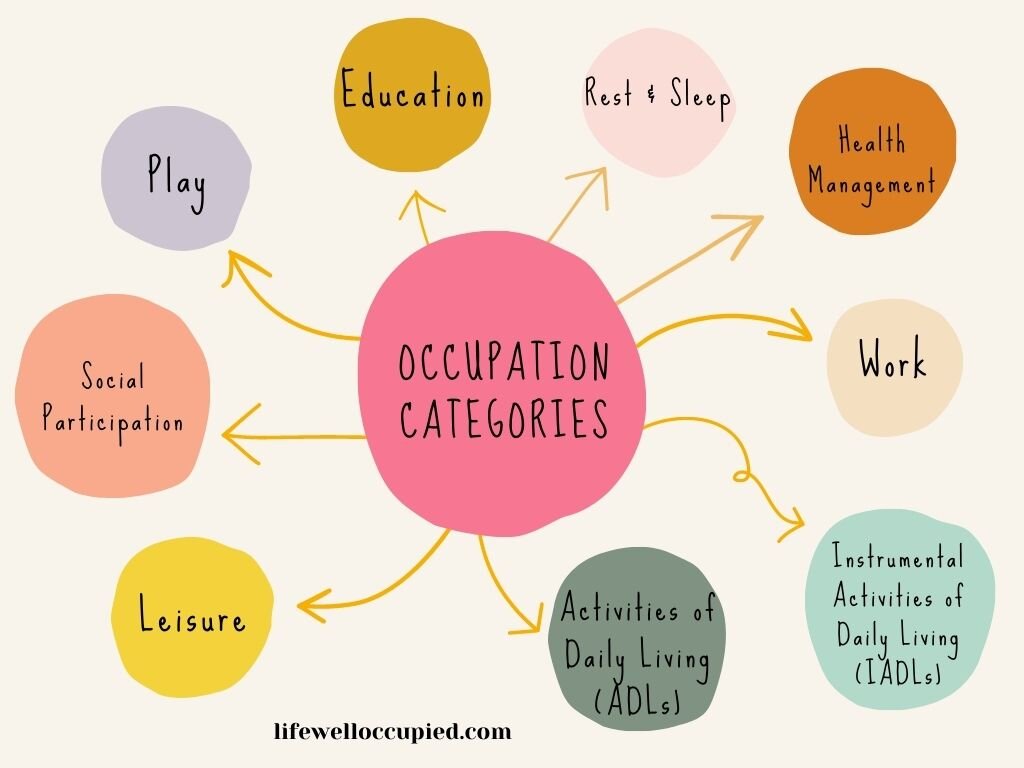Occupations: Expanding our Definitions
Mind map of 9 occupation categories of 4th edition of Occupational Therapy Practice Framework: Activities of Daily Living, Instrumental Activities of Daily Living, Work, Play, Leisure, Education, Social Participation, Health Management, Rest and Sleep.
Occupation- a definition we’ll keep coming back to
In occupational therapy, our definition of occupation far exceeds what most of us think of as occupation— work or a job. As we have talked previously, work is one of the categories of occupation but there are several others. Why do I want the general public to share in understanding this broadened definition? Because the way we occupy our time matters to our health— the way we spend not just our money— also our time, our energy, our resources, our gifts— matters to our health and well-being not only as individuals, but as a whole. Understanding how these occupations all fit together and influence one another is an investment I hope to see us all take under careful consideration.
In the graphic above, you will find 9 categories of occupations that occupational therapy practitioners consider.
In addition, occupational therapy practitioners consider more than just what the occupations are— we look at how you do them (or what we call performance patterns), who you do them with (social participation), context of the environment, performance patterns and person factors (could include where and when), and much more. In short, understanding what matters most to you and the things you want, need, or are expected to do with your time is key to how we are a partner in your health and well-being.
Current understanding of occupation and occupational therapy
People are most likely more familiar with occupational therapy when there has been a change in how someone functions due to illness, injury, or another change in function. When someone is working to figure out how they are going to live their live now that “XYZ has happened”, occupational therapy is a valuable partner. And, occupational therapy services do not have to wait until there is such a change in function.
I wonder if…
What might it look like to have a yearly check-in or screen with an occupational therapist to determine how the ways we are occupying our time are serving our health and well-being? What if this was not just for individual check-ups by team check-ups, or community check-ups? Could having occupational check-up routines help us as a society to make decisions that could best help us live healthier and more connected lives as individuals and collectives? Do we have understandings of why we choose to do what we do with our time as individuals and groups and how they influence one another? If we or others are having difficulty accessing or participating in any of these occupations above— what might the impact be?
Checking your understanding
Today, we’ll be offering a quiz on social media to check our current understanding of what occupational therapy practitioners consider. It isn’t an all encompassing list— just 3 questions to look at what occupation means and get us started on further conversation. It is enough to facilitate us wondering a bit more about how understanding the way we occupy our time may be beneficial.
If you get them all correct— congratulations! If not, don’t worry as many people have not heard of occupation defined in this way. After taking the quiz, my questions for you are—
If your yearly health check-ups included this broadened understanding, how might it be of benefit to you, small and large groups?
Do you have any current processes where you check how these areas all fit together in your work, your medical care, or your community? If not, what do you think could be helpful?
Recap of occupation categories discussed so far
There is a lot to consider and you may have heard me mention that occupational therapy can look a bit like understanding an iceberg as there are many factors being considered of the person, groups, or communities, and environments that result in how anyone is engaging in occupations (anything you need to do, want to do, or are expected to do).
So far on the blog, we’ve talked a bit about work, rest and sleep, leisure and social participation as categories of occupation. Friday we’ll dive deeper into leisure and play as refueling occupations.
Those are just 5 categories of occupations— see how much your understanding of occupation has grown already? We look forward to more conversations with you as we continue to build our awareness of what occupation means and can do for our health and well being.
Stay tuned for the quiz!

